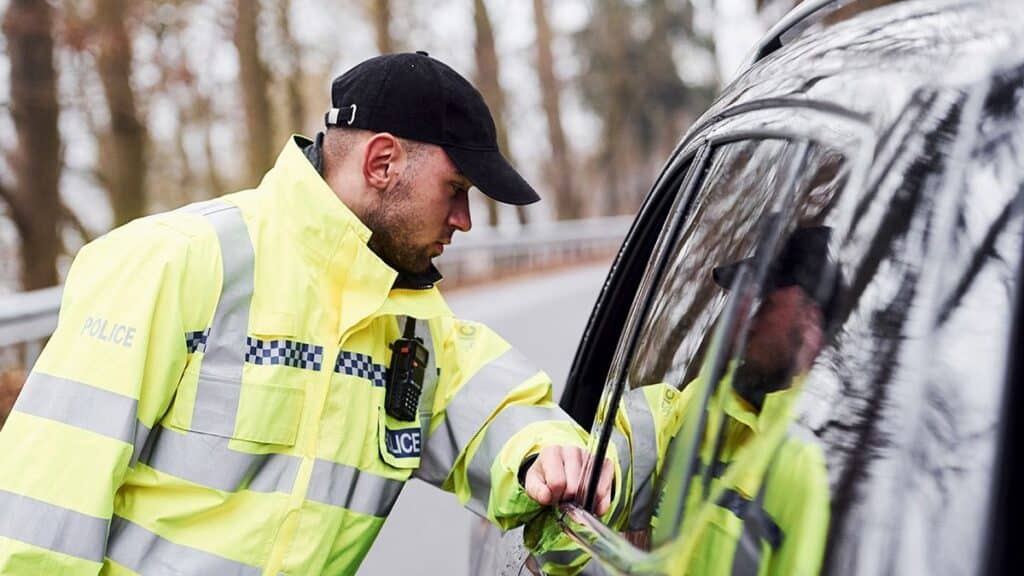In Victoria, you can be charged if you refuse a saliva sample for an oral fluid test under section 49(1)(eb) of the Road Safety Act 1986. Random roadside drug testing uses saliva samples to detect illicit drugs. Refusal to comply with a police officer's lawful request to provide a saliva sample is an offence, and it can result in fines and loss of license, with even harsher penalties for repeat offenders.
If you've been charged with refusing a sample and need legal help, please contact our experienced driving offence lawyers. Drink and drug driving offences can have significant consequences, including losing your licence, severe financial penalties, or even prison in more extreme cases. Engaging an experienced driving offence lawyer is vital to achieving a not guilty verdict or minimising the penalties you may face.

Saliva Tests and Drug Driving Offences
What is a saliva test and how is it used in drug driving cases?
A saliva test (also known as an oral fluid test) is used to detect the presence of illicit drugs in a person’s oral fluid. The test is commonly used by police officers in roadside drug testing to determine if a driver has drugs in their system. The test is usually conducted using a prescribed device, such as a saliva testing kit. The results of the test can be used as evidence in court to support a drug driving charge.What drugs are detected in an oral fluid test?
Roadside saliva tests can detect the following:
- THC (Delta-9 tetrahydrocannabinol), the active component in cannabis
- Methamphetamine, which is found in drugs such as ’speed’, ’base’, ‘ice’, and ‘crystal meth’
- MDMA, which is known as ecstasy.
Refusing a Saliva Sample: Consequences and Penalties
Understanding the Road Safety Act 1986
Under section 49(1)(eb) of the Road Safety Act 1986 (RSA), it is an offence to refuse to provide a sample of oral fluid when lawfully requested to do so by a police officer. Offence - section 49(1)(eb)(1) A person is guilty of an offence if he or she—
(eb) refuses to provide a sample of oral fluid in accordance with section 55D or 55E when required under that section to do so or refuses to comply with any other requirement made under that section
In order to understand the circumstances in which a police officer may request a sample of oral fluid under section 49(1)(eb), the section must be read in conjunction with sections 55D and 55E. Preliminary oral fluid test - section 55D(1) A police officer may at any time require—
(a) any person he or she finds driving a motor vehicle or in charge of a motor vehicle; or
(b) the driver of a motor vehicle that has been required to stop at a preliminary testing station under section 54(3); or
(c) any person who he or she believes on reasonable grounds has within the last 3 preceding hours driven or been in charge of a motor vehicle when it was involved in an accident; or
(d) any person who he or she believes on reasonable grounds was, within the last 3 preceding hours, an occupant of a motor vehicle when it was involved in an accident, if it has not been established to the satisfaction of the police officer which of the occupants was driving or in charge of the motor vehicle when it was involved in the accident—
to undergo a preliminary oral fluid test by a prescribed device and, for that purpose, may further require the person, if inside a motor vehicle, to leave the motor vehicle for the purpose of undergoing the test.
Oral fluid test (evidentiary test) - section 55E(2) If a person undergoes a preliminary oral fluid test when required to do so under section 55D by a police officer or an enforcement officer and—
(a) the test, in the opinion of the police officer or enforcement officer in whose presence it is made, indicates that the person's oral fluid contains a prescribed illicit drug; or
(b) the person, in the opinion of the police officer or enforcement officer, refuses or fails to carry out the test in the manner specified in section 55D(6)—
any police officer or, if the requirement for the preliminary oral fluid test was made by an enforcement officer, any police officer or any enforcement officer may require the person to provide a sample of oral fluid for testing by a prescribed device and, if necessary, analysis by a properly qualified analyst within the meaning of section 57B and for that purpose may further require the person to accompany any police officer or, if the requirement for the preliminary oral fluid test was made by an enforcement officer, any police officer or any enforcement officer to a place or vehicle where the sample is to be provided and to remain there until—
(c) the person has provided the sample and any further sample required to be provided under subsection (5), the sample has been tested by a prescribed device and the person has been given (if necessary) a part of the sample under subsection (11) and complied with any requirement made of him or her under section 59; or
(d) 3 hours after the driving, being an occupant of or being in charge of the motor vehicle—
whichever is the sooner.
Example
A person may be required to go to a police station, a public building, a booze bus or a police car to provide a sample of oral fluid under this section.
